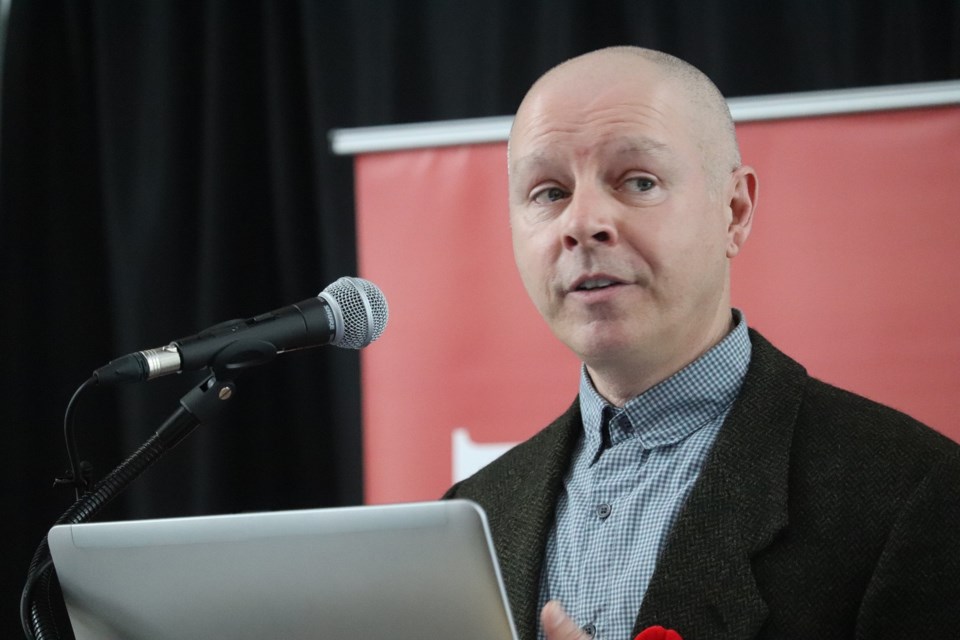One of Canada’s largest mining companies is based in the Nechako watershed and it wants to better understand its water management and resources in ensuring long-term security.
Rio Tinto has decided to partner with UNBC in Prince George in providing $1.5 million over the next five years to Dr. Stephen Déry and a team of 13 students to collect data from the Nechako River basin’s water supply and better understand its effects in climate change.
The Natural Sciences and Engineering Research Council (NSERC) of Canada is also putting their hand in the huddle for this project, naming Dr. Déry as the first-ever senior industrial research chair in UNBC’s history today (Nov. 4).
“It’s just such an honour to be nominated as UNBC’s first industrial research chair,” said Dr. Déry when asked by PrinceGeorgeMatters about taking arguably the biggest step of his 15-year career with the Prince George post-secondary school.
“Of course, there’s a lot of challenges coming up, there’ll be a lot of work, but we’re looking forward to that challenge and again, it’s work that’s being done here in the north for the benefit of the residents within the Nechako watershed and beyond.”
.@UNBC partners with @RioTinto & @NSERC_CRSNG in a $1.5M project to research water management on the Nechako River basin for the next 5 years | #CityOfPG #NorthernBC @PGMatters pic.twitter.com/I9DLcTLQtP
— Kyle Balzer (@KyleBalzer) November 4, 2019
That research Dr. Déry is referring to, which already began in July this year, will hope to understand the causes for changes in hydrology of the watershed in relation to its movement with the land and surrounding environment.
He points to recent natural disasters in the north-central B.C. region and how Rio Tinto, who manages a section of the Nechako River basin, wants to understand the behaviour of the entire watershed, the areas they do not occupy, for future projects and resource needs.
“We’ve had major wildfires across the watershed; what’s the impact of the hydrology of the watershed as well? So we want to get the details of what’s causing these changes that we’re observing. Obviously, there’s a human-intervention component, but also the climate change component and many other factors as well.”
In addition to going out with his team of doctoral candidates, masters and undergrad research students, Dr. Déry says community engagement will be vital to their findings before publishing reports to peer-reviewed journals.
When asked the question by PrinceGeorgeMatters, he explained the social media channels the project has created will provide an avenue for local residents within the Nechako watershed to give feedback as well.
“I think this is a great opportunity not only to develop our own personal knowledge here with our students, but also, to disseminate that information to stakeholders and the general public,” Dr. Déry said.
“We intend to have a very big presence in the watershed over the next five years, going to the local communities, reporting on our findings [...] so we do intend to keep the community informed and at the same time, we hope those communities can provide us some feedback. What’s happening on the ground? What are they seeing in our part of the watershed, and can we help them may be in understanding what’s going on.”
There are 3 themes Dr. Stephen Déry will focus for research development…
— Kyle Balzer (@KyleBalzer) November 4, 2019
▪️Hydrometerological monitoring
▪️Atmospheric & terrestrial rivers
▪️Hydrological & water temperature modelling
Dr. Déry says these will help better understand climate change & human activity | #CityOfPG pic.twitter.com/HjwFVTCRge
The students involved with Dr. Déry’s research are set to benefit academically speaking with opportunities for similar internships in B.C. and Quebec.
He also clarified that Rio Tinto will not have any influence in determining the results the Nechako watershed team will obtain the next half-decade and share with the international organization on a monthly basis, but they are willing to throw in some extra cash.
Rio Tinto BC Works General Manager Affonso Bizon says there’ll be a $300,000 investment over two years after the five-year project should Dr. Déry’s team if needed.
“This partnership will build on Rio Tinto’s long standing support for the UNBC and commitment to managing the Nechako watershed responsibly,” said Bizon. “We share UNBC’s commitment to advancing education and research in the region, and look forward to seeing the findings from this work to build on our environmental management program for the Nechako.”
UNBC President Dr. Daniel Weeks was also excited for today’s announcement, highlighting collaborations help make the post-secondary, and its students, leaders in research.
“It’s everything for us in the north, it’s all about partnerships,” said UNBC President Dr. Daniel Weeks at the podium.
“We’ve had a long standing partnership with Rio Tinto and that’s already led to such important discoveries that leave long standing results that really change our planet, not just the north but it changes everything.”
UNBC will also be sharing its findings with local fisheries facilities within the watershed, including Nechako White Sturgeon Recovery Initiative and the Vanderhoof district council.



